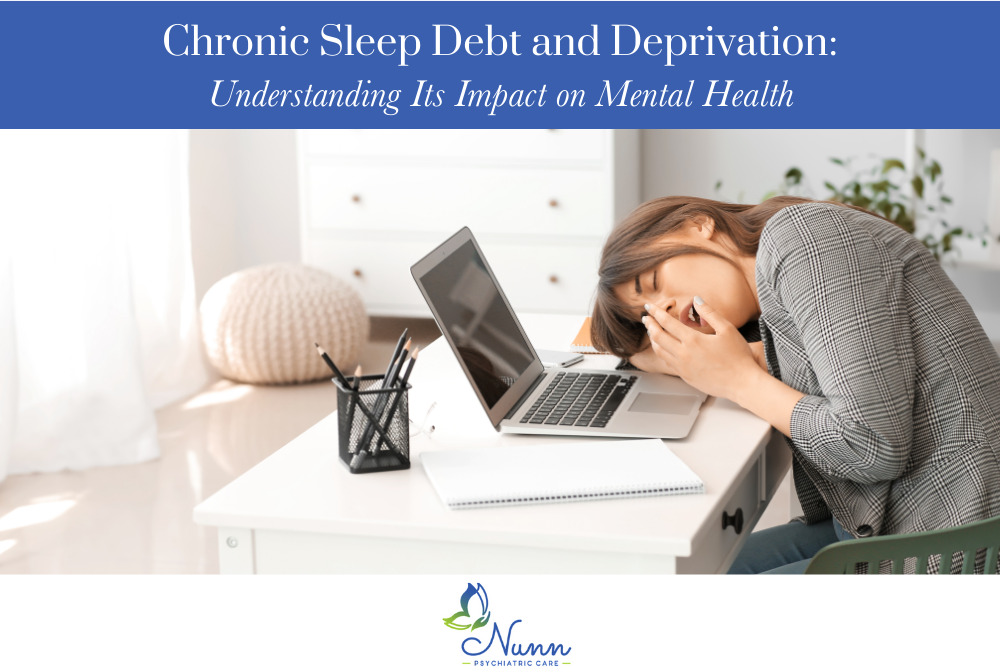
In today’s fast-paced world, sleep often takes a back seat to work, responsibilities, and screen time. While the occasional late night might not seem harmful, chronic sleep deprivation—also known as sleep debt—can take a serious toll on your mental health. At Nunn Psychiatric Care, we believe understanding the relationship between sleep and mental well-being is critical for long-term emotional and psychological resilience.
What Is Chronic Sleep Debt?
Sleep debt refers to the cumulative effect of not getting enough sleep over several days, weeks, or even months. While you might try to “catch up” on weekends, the brain and body do not recover fully from ongoing deficits in rest. Chronic sleep debt can lead to more than just fatigue—it can disrupt mood regulation, impair cognitive function, and increase vulnerability to mental health disorders.
The Link Between Sleep and Mental Health
Sleep is not just rest—it is a vital biological function that supports memory consolidation, emotional regulation, and brain detoxification. When this process is disrupted over time, several issues can arise:
1. Increased Risk of Anxiety and Depression
Studies show that people who experience chronic sleep deprivation are significantly more likely to develop anxiety disorders and depression. Poor sleep can amplify emotional reactivity, making everyday stress feel overwhelming.
2. Cognitive Impairment
Sleep deprivation can impair concentration, decision-making, and problem-solving skills. Over time, it may even affect memory and the ability to process emotions effectively—leading to poor coping mechanisms and increased irritability.
3. Mood Dysregulation
Insufficient sleep can cause mood swings, emotional instability, and heightened sensitivity to stress. This can strain relationships and reduce overall quality of life.
4. Exacerbation of Existing Mental Health Conditions
For individuals already living with mental health conditions like bipolar disorder, PTSD, or ADHD, chronic sleep loss can worsen symptoms and interfere with treatment effectiveness.
The Vicious Cycle of Sleep and Mental Illness
Poor sleep can cause mental health issues, and mental health issues can cause poor sleep—a self-perpetuating cycle. For instance, someone suffering from depression may struggle with insomnia or hypersomnia, and in turn, those sleep problems can worsen their depressive symptoms. Breaking this cycle often requires professional intervention and a holistic treatment approach.
How Nunn Psychiatric Care Can Help
At Nunn Psychiatric Care in Hodgenville, KY, we understand that chronic sleep deprivation is both a symptom and a contributing factor to many psychiatric conditions. That’s why we take a comprehensive approach to mental wellness, including:
- Thorough psychiatric evaluations
- Customized treatment plans
- Medication management when appropriate
- Cognitive behavioral therapy (CBT) for insomnia
- Lifestyle and behavioral coaching
- Referral for sleep studies when necessary
We work closely with our patients to identify the root causes of sleep disturbance and develop sustainable strategies for improving both sleep hygiene and mental health.
Tips for Improving Sleep Hygiene
If you’re experiencing ongoing sleep problems, here are a few tips to start improving your sleep habits:
- Stick to a consistent sleep schedule, even on weekends
- Limit screen time before bed and avoid using electronics in bed
- Avoid caffeine, alcohol, and large meals in the evening
- Create a calming bedtime routine and restful sleep environment
- Exercise regularly—but not right before bed
- Seek professional help if sleep issues persist
Frequently Asked Questions (FAQs)
Q: How many hours of sleep do adults really need?
A: Most adults need 7–9 hours of sleep per night. However, the quality of sleep matters just as much as the quantity.
Q: Can chronic sleep deprivation lead to permanent mental health problems?
A: While effects can be reversed with proper treatment and sleep recovery, long-term deprivation may contribute to persistent mood disorders and cognitive decline.
Q: What mental health conditions are most affected by poor sleep?
A: Anxiety, depression, PTSD, ADHD, and bipolar disorder are commonly worsened by sleep disturbances.
Q: Can medication help me sleep better?
A: In some cases, short-term use of sleep aids or psychiatric medication may be helpful. However, we often recommend behavioral therapies and lifestyle changes for long-term results.
Q: What is CBT-I and how can it help?
A: CBT-I (Cognitive Behavioral Therapy for Insomnia) is a structured, evidence-based treatment that helps individuals change negative sleep patterns and behaviors. It is highly effective in treating chronic insomnia without the use of medication.
Take the First Step Toward Restful Sleep and Better Mental Health
If you or a loved one is struggling with chronic sleep issues and experiencing the emotional consequences, don’t wait to seek help. At Nunn Psychiatric Care, we are here to support your journey to mental wellness—one restful night at a time.
📍 Address:
Nunn Psychiatric Care
113 Lincoln Dr
Hodgenville, KY 42748
📞 Phone: (270) 358-6221
🌐 Website: Request An Appointment
Restorative sleep is not a luxury—it’s a necessity. Let us help you restore balance, clarity, and calm.
